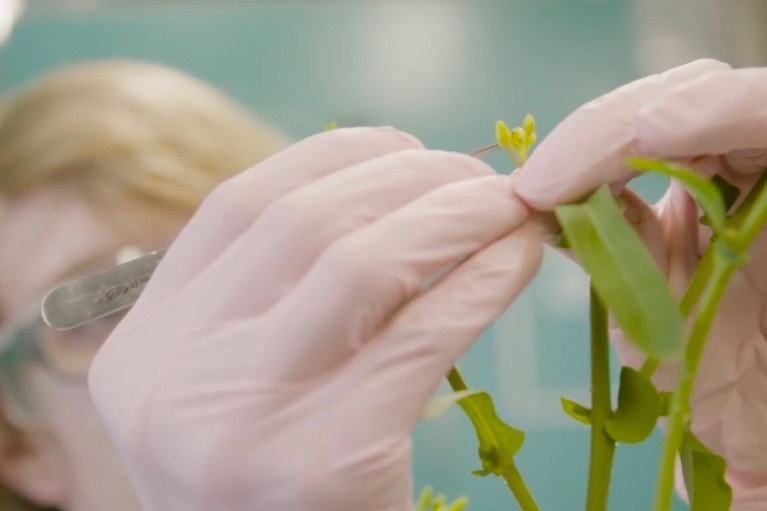Supercluster backing canola protein production
- Posted:
- Category:
- PIC in the News

The federally-backed research and development “supercluster” set up to boost Canada’s protein industries is funding work to wring more and better proteins out of canola seed.
In Saskatoon on Wednesday, federal Industry Minister Navdeep Bains announced the Protein Industries Canada (PIC) supercluster has approved a new $27.6 million project to breed high-protein canola hybrids for both human consumption and animal feed, using gene-editing technology.
Participants in the new PIC-backed project also include ag chem and seed firm Corteva Agriscience, the Canadian arm of agrifood giant Bunge, and Calgary plant-based ingredients processor Botaneco.
Corteva on Wednesday hailed the effort as “the first commercial plant-breeding project focused specifically on canola protein quality improvement.”
High-protein seed genetics “will transform Canadian canola to be both a high-value oil and a high-value meal crop,” Corteva Canada president Bryce Eger said in that company’s release.
The new seed varieties to come out of the project “are expected to be well suited for both traditional processing methods like crushing and newer technologies like the one being developed through the supercluster’s first supported project announced in June,” the government said in its release.
The project will bring in genetics from Corteva’s breeding programs as well as from public-sector sources such as Agriculture and Agri-Food Canada, PIC said.
Bunge, meanwhile, will process the high-protein canola, “resulting in high-protein meal to be used in poultry and swine feeding studies to quantify animal performance,” and will also evaluate new end-use markets.
High-protein canola produced through the project will also be used in Botaneco’s processing platforms, creating protein concentrates for use in aquaculture studies as well as protein isolates for human food testing.
“By investing in breeding to improve protein and reduce fibre, we will increase the value of Canadian canola and open up new markets for food and feed applications, resulting in higher demand and prices for the meal,” PIC CEO Bill Greuel said, noting the meal is “traditionally sold at a discount.”
Being able to offer a high-protein and reduced-fibre meal “will allow us to sell into local feed markets where we currently struggle to compete,” Ryan Law, North America canola commercial manager for Bunge, said in the same release.
The feds are investing up to $13.6 million in the new project through PIC, while $14.05 million will come from other consortium partners, PIC noted.
Canola R+D has generally focused on yield and traits such as pod shatter and disease resistance, Corteva said — traits that are “critical to profitable and sustainable production.”
This breeding program, however, “will place Canadian canola researchers in a global leadership position and create an entirely new canola ecosystem,” the company said.
New isolates
The goal of ramping up canola’s overall protein content dovetails with another project in which PIC announced an investment separately the previous Friday.
In Winnipeg that day, Bains and senior local MP Jim Carr announced up to $9.5 million in PIC backing for a project to commercialize “new highly-soluble, highly-functional pea and canola protein isolates.”
The new isolates to come out of the project “will eliminate the grittiness experienced with less soluble proteins and will improve the flavour profiles of plant-based products, including in plant-protein beverages and meat alternatives,” the government said.
Merit Functional Foods, Pitura Seeds, The Winning Combination and the Manitoba Food Development Centre are collaborating on the project, which is expected to use patented technology from Burcon NutraScience to produce the new protein isolates “with more than 90 per cent purity.”
The PIC investment “will be matched at least dollar for dollar by industry and other partners,” the government said.
Merit is building a plant at Winnipeg’s CentrePort to produce plant-based proteins; The Winning Combination, another Winnipeg company, processes natural health products and dietary supplements and “will help Merit assess pea and canola functionality and stability.” The Manitoba Food Development Centre at Portage la Prairie is a fee-for-service agency which handles R+D and commercialization work for Manitoba agrifoods and ingredients.
Pitura Seeds, based near Winnipeg at Domain, Man., will use its seed cleaning plant to develop cleaning standards to “achieve optimal protein and quality levels for canola and peas,” and will also test varieties for the best “agronomic fit” for Prairie growers. — Glacier FarmMedia Network
Published by Manitoba Co-operator
Written by GFM Network News, Gfm Staf
